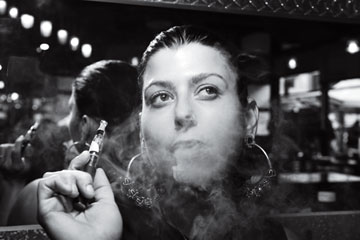
(5 of 7)
Weiss says his goal is to make combustible cigarettes obsolete. To achieve that, NJOY is trying to craft an analogue so similar to the real thing that smokers won't be able to tell the difference. They may be getting close. In December 2012, NJOY released the King, a disposable e-cigarette that is white, with a little foil-like gold line at one end and a gray tip that lights up yellow and makes a crackling sound when you take a drag. Unlike the other mass-market brands sold at convenience stores, including Lorillard's Blu and Reynolds American's Vuse, the King isn't a hard piece of metal. It is spongy, simulating the give of tobacco rolled in paper. Its hard plastic case combines the classic Americana glamour of Marlboro with a top that snaps open and clicks shut with a satisfying feel that evokes a Zippo lighter. NJOY is already the market leader, and as of February the King represented 65% of the growth in the entire electronic-cigarette category last year, according to Weiss. Thanks to $75 million in new funding from investors, including Napster co-founder Sean Parker, NJOY is expanding into the European market, which has three times as many smokers as the U.S. "The incredible sort of revolution happening in the United States with electronic cigarettes," Weiss quips, "is not because of devices that look like light sabers."
But as much as the King looks and handles like a cigarette, it doesn't yet replicate the sweet sensation of smoking. The disposable e-cigs sold in convenience stores--like King and even Blu, with its blue light at the tip--are not as dorky as the magic wands Babaian sells, but they also can't do what her rechargeable cigarettes can. They don't replicate the heat, the amount of nicotine or the throat hit--that tingling sensation in the back of the smoker's throat right when the nicotine is about to hit the brain. No one quits on "cig-a-likes," Babaian says, pointing to a green cup by the register where she keeps them, labeled CRAP CUP. They aren't for converts, she explains, but for young people looking for novelty or a way to smoke inside when they are at a bar.
Weiss admits that most of his customers use both, a fact NJOY acknowledges by leaving space in King's case for real cigarettes. That's a pattern that public-health experts fear, but Weiss says it's temporary until the technology improves. Comparing NJOY to David and Big Tobacco to Goliath, Weiss sees e-cigarettes as a disruptive technology that can eliminate tobacco smoking and change the world.
"There is going to be a Nobel Prize in this for somebody, and it is going to be one of my scientists," he told me. "He is going to save more lives than Jonas Salk," the inventor of the polio vaccine. Weiss was referring to Josh Rabinowitz, a professor of chemistry and integrative genomics at Princeton, who has been consulting with NJOY.
